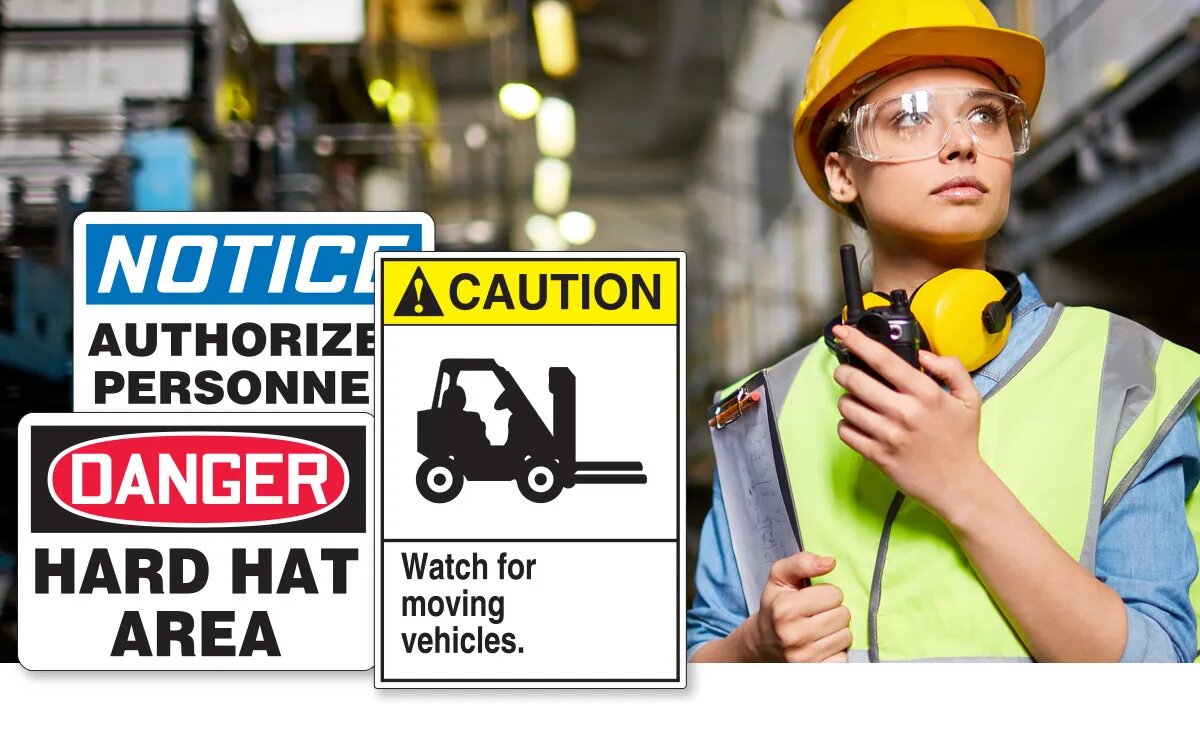April 3, 2023 | Posted by MICRO

Just as rules are made to protect people from harmful situations, workplace safety signs are used to protect the health and safety of others.
Consider workplace safety signs as the first line of defense against hazardous and potentially deadly situations. It is important to train workers on the meanings of safety signs and the symbols used on signs. Below is a list of signs needed in a variety of work environments.
Even with the use of workplace safety signs, one of the most commonly cited OSHA statistics claims that more than 4.1 million workers suffer serious job-related injury or illness every year. Based on this alarming figure, you may have questioned the importance of safety signs – since major injuries still occur in the workplace.
Although all businesses are faced with different hazards, when it comes to injury and illness prevention, they share one common objective – to keep workers safe. In fact, under the OSH law, employers are responsible for providing a safe workplace and using color codes, posters, labels, or signs to warn employees of potential hazards.
The truth is that the best way to stop injuries from occurring in the workplace is to post effective safety signs. The value of posting high-performance signage in proper places throughout the workplace or job site can’t be overstated. Read more about high-performance signage.
What are the safety sign requirements today?
Specifications for safety signs are spelled out in OSHA 191.145(a)(1) and indicate “…use of signs or symbols that indicate and, insofar as possible, define specific hazards that could harm workers or the public, or both, or to property damage. These specifications are intended to cover all safety signs except those designed for streets, highways, and railroads. These specifications do not apply to plant bulletin boards or safety posters.”
“Signs and symbols required by this subpart shall be visible at all times when work is being performed, and shall be removed or covered promptly when the hazards no longer exist,” per OSHA 1926.200(a).
Under OSHA’s revised Hazard Communication Standard, in addition to standard OSHA signs, organizations can now use either the ANSI Z35.1-1968 or ANSI Z535.2-2011, and ANSI Z35.2-1968 or Z535.5-2011, concerning such additional rules.
What signs need to be posted in the workplace?
No matter what type of business you are in, safety signs will always be needed in the workplace. Just saying that there need to be safety signs does not tell you which signs you will need.
The workplace safety signs necessary will depend on the type of business you operate. Here are a few examples of workplaces that need safety signs.
- Factories – Factories need a wide variety of workplace safety signs. Depending on the type of factory, they need danger, caution, instruction, and dangerous chemical signs.
- Offices – Offices generally need the fewest safety signs, but you should not underestimate the importance of safety signs in the workplace, even in a seemingly simple workplace. If your office has any kind of chemical or equipment, you will need a safety sign.
- Warehouses – The safety signs necessary for a warehouse will depend on what you have in the warehouse. There will be standard equipment and danger signs, as well as signs for any dangerous chemicals your warehouse might contain.
- Laboratories – Laboratories need chemical, danger, caution, and instruction signs. They will have far more chemical and instruction signs than other types of businesses.
- Construction and worksites – Each construction and worksite will have its own safety sign needs. It will depend on what type of site it is. Most of the signs will need to be portable, depending on the amount of time you are at the site.
This is only a small example of businesses that need different types of safety signs.
OSHA classification of signs:
- Danger Signs – Indicate a hazardous situation that, if not avoided, will result in death or a severe injury. Danger signs must have red as the predominant color for the upper panel, a black outline on the borders, and a white lower panel for additional sign wording.
- Caution Signs – Indicate a hazardous situation that, if not avoided, could result in minor or moderate injury. Caution signs are required to have yellow as the predominant color and black upper panel and borders. Black lettering should be used for additional wording.
- Safety Instruction Signs – Indicates specific safety-related instructions or procedures that are related to safe work practices. Safety instruction signs are required to be white with a green upper panel with white letters. Any additional wording should be printed with black on a white background.
Next time you walk past a safety sign, take a moment to appreciate the message fully and understand its role in preventing injuries and death.


